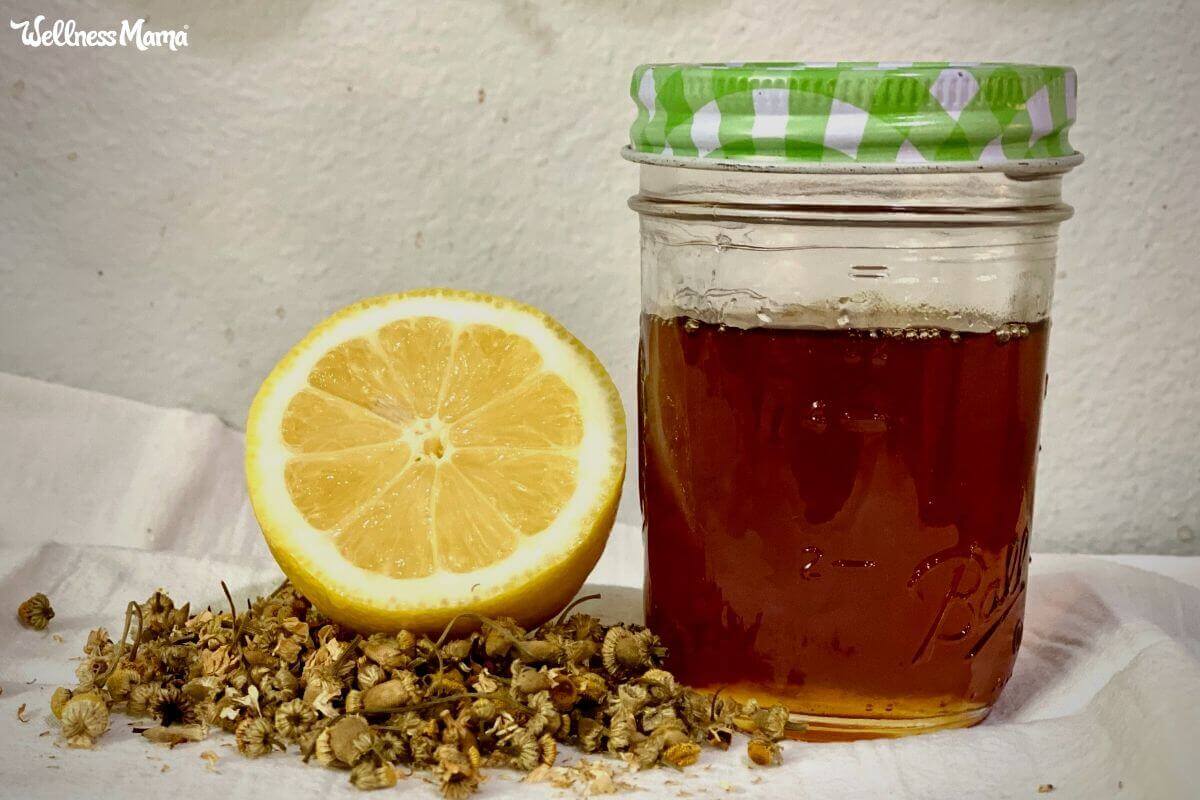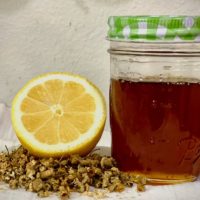We don’t get sick often, and when we do, I prefer to let the body fight the illness naturally whenever possible. That being said, illnesses that include coughing (like bronchitis or a particularly bad flu season) can be exhausting and uncomfortable because they limit the ability to sleep well.
In those cases, I use this homemade cough syrup to soothe the urge to cough and help the afflicted get some much-needed rest.
Ingredients for a Natural Cough Remedy
This easy home remedy is full of healthy ingredients that naturally soothe a sore throat and boost the immune system.
Here are the essential ingredients of this cough medicine, and the healing properties of each:
- Raw honey can help stop the coughing (as long as the children taking it are over a year old). In fact, a spoonful by itself could do the trick!
- Lemon juice provides a necessary dose of vitamin C.
- Fresh ginger is naturally anti-inflammatory and has an expectorant action, but ground ginger works just as well.
- Chamomile soothes muscles, making it useful in relieving the “tickle” in the throat, plus it promotes restful sleep.
- Marshmallow root has one of the highest mucilaginous contents of all herbs and coats and soothes the throat.
- Cinnamon helps boost the immune system and improve taste.
You can find most of these ingredients in your local health store, grocery store, or on Amazon. I’ve provided links in the recipe below to the sources I use.
FAQs
I’ve gotten a lot of great questions about my homemade cough syrup recipe! Here’s a few common ones:
- Where can I find chamomile flowers? You can find whole flowers at a local herb store, Asian market, or online. You can also use pure chamomile tea bags if that’s easier. Or you can grow your own! If you want to use chamomile oil, add it after the concoction has cooled.
- What if I don’t have marshmallow root? You can use fenugreek seeds instead, or just skip it.
- Can I freeze small portions in an ice tray to extend shelf life? Sure, why not!
- How long will this last? For two months in the fridge.
- Can I add healthy additions to make this cough suppressant even more powerful? Yes! A bit of horehound, slippery elm, cherry bark extract, apple cider vinegar, turmeric, or cayenne pepper would all make great add-ons.
- What about young children? I stick to nursing and warm Epsom salt baths for babies. Check with your doctor about using raw honey on children under 2. You can also replace the honey with maple syrup for very young kids if you’re concerned about the honey.
- Can I add essential oils? I’d be careful, as most essential oils should not be taken internally.
- How should I store this homemade cough remedy? In the fridge in an airtight container. A glass jar would be a great choice.
- Is this cough syrup good for a dry cough? While this one can help, this wild cherry bark cough syrup is particularly good with dry, hot, irritated coughs. Traditionally it’s been used for whooping cough, chronic coughs, pneumonia, and bronchitis.
Homemade Herbal Cough Syrup Recipe
This easy combination of herbs helps soothe the throat to ease coughing and promote restful sleep. I only use this remedy on children who are older due to the raw honey. Check with your doctor before using with kids under two years old. If you want to be extra careful, you can also substitute maple syrup in its place.
Honey Cough Syrup Recipe
Materials
- 4 cups water
- ¼ cup ginger (fresh grated or dried)
- ¼ cup chamomile flowers
- ¼ cup marshmallow root
- 1 TBSP cinnamon
- ¼ cup lemon juice
- 1 cup honey
Instructions
- In a medium size saucepan, combine the water and dried herbs.
- Bring it to a boil and then reduce to a simmer.
- Simmer until the volume is reduced by about half (you will need 1 cup of liquid after herbs are strained off).
- Pour the herb infused water through a fine mesh strainer or cheesecloth to remove herbs (compost the herbs!).
- While the liquid is still warm, whisk in the lemon juice and honey.
- Store in an airtight container in the fridge for up to 2 months.
Notes
Note: My personal experience cannot replace medical advice. Please check with your doctor if concerned about symptoms.
Have you ever made cough syrup? What herbs did you add? What natural remedies do you use to ease coughing? Share below!






Leave a Reply